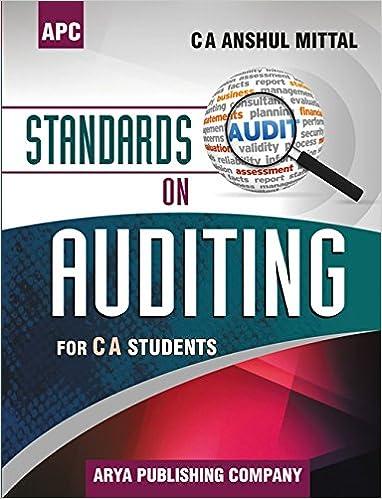Answered step by step
Verified Expert Solution
Question
1 Approved Answer
Exhibit 1.15 is below: Please show work in excel. Problems and Cases 1.10 Effect of Industry Characteristics on Financial Statement Relations. Effective financial statement analysis
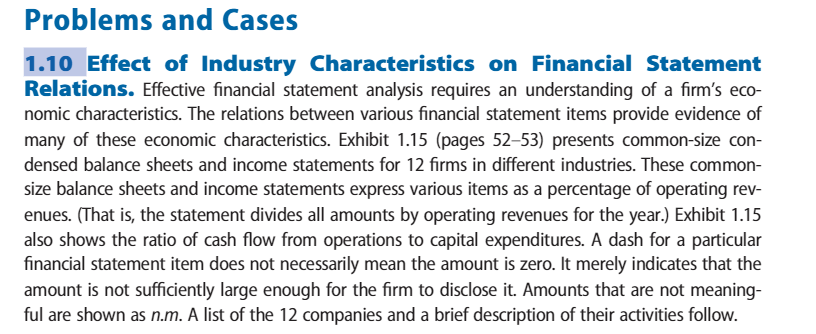
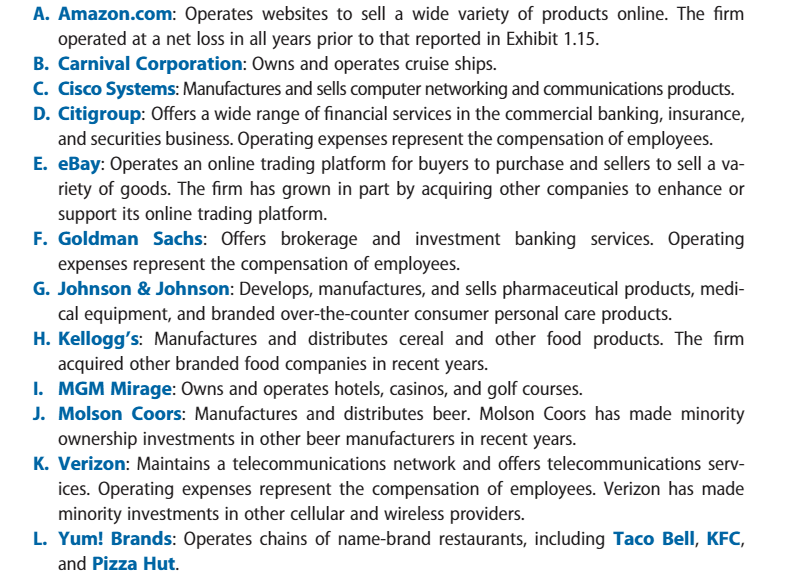

Exhibit 1.15 is below:
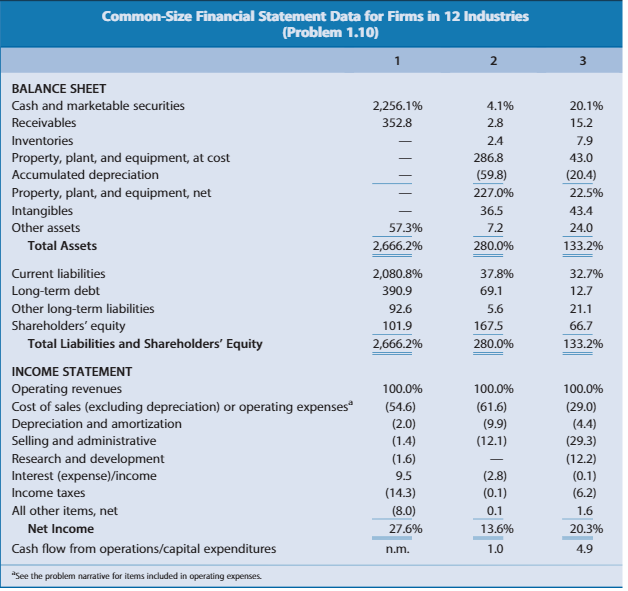
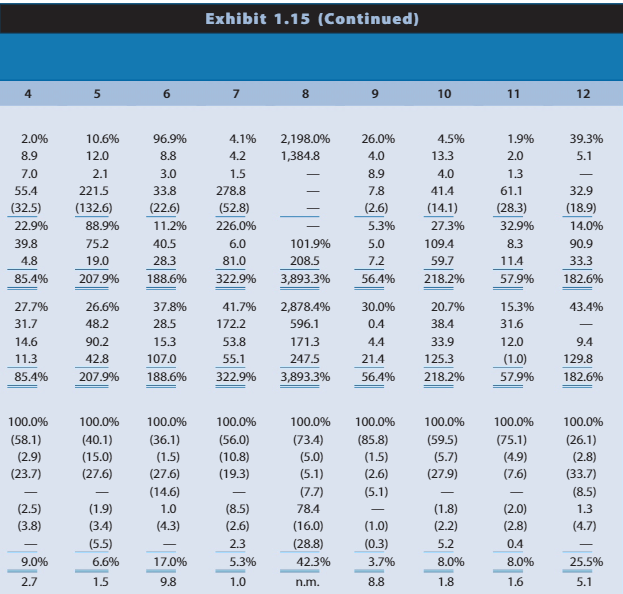
Please show work in excel.
Problems and Cases 1.10 Effect of Industry Characteristics on Financial Statement Relations. Effective financial statement analysis requires an understanding of a firm's eco- nomic characteristics. The relations between various financial statement items provide evidence of many of these economic characteristics. Exhibit 1.15 (pages 52-53) presents common-size con- densed balance sheets and income statements for 12 firms in different industries. These common- size balance sheets and income statements express various items as a percentage of operating rev- enues. (That is, the statement divides all amounts by operating revenues for the year.) Exhibit 1.15 also shows the ratio of cash flow from operations to capital expenditures. A dash for a particular financial statement item does not necessarily mean the amount is zero. It merely indicates that the amount is not sufficiently large enough for the firm to disclose it. Amounts that are not meaning- ful are shown as n.m. A list of the 12 companies and a brief description of their activities follow. A. Amazon.com: Operates websites to sell a wide variety of products online. The firm operated at a net loss in all years prior to that reported in Exhibit 1.15. B. Carnival Corporation: Owns and operates cruise ships. C. Cisco Systems: Manufactures and sells computer networking and communications products. D. Citigroup: Offers a wide range of financial services in the commercial banking, insurance, and securities business. Operating expenses represent the compensation of employees. E. eBay: Operates an online trading platform for buyers to purchase and sellers to sell a va- riety of goods. The firm has grown in part by acquiring other companies to enhance or support its online trading platform. F. Goldman Sachs: Offers brokerage and investment banking services. Operating expenses represent the compensation of employees. G. Johnson & Johnson: Develops, manufactures, and sells pharmaceutical products, medi- cal equipment, and branded over-the-counter consumer personal care products. H. Kellogg's: Manufactures and distributes cereal and other food products. The firm acquired other branded food companies in recent years. 1. MGM Mirage: Owns and operates hotels, casinos, and golf courses. J. Molson Coors: Manufactures and distributes beer. Molson Coors has made minority ownership investments in other beer manufacturers in recent years. K. Verizon: Maintains a telecommunications network and offers telecommunications serv- ices. Operating expenses represent the compensation of employees. Verizon has made minority investments in other cellular and wireless providers. L. Yum! Brands: Operates chains of name-brand restaurants, including Taco Bell, KFC, and Pizza Hut. REQUIRED Use the ratios to match the companies in Exhibit 1.15 with the firms listed above, and explain your reasoning using the strategy framework in the chapter. 3 2.8 Common-Size Financial Statement Data for Firms in 12 Industries (Problem 1.10) 2 BALANCE SHEET Cash and marketable securities 2,256.1% 4.1% Receivables 352.8 Inventories 2.4 Property, plant, and equipment, at cost 286.8 Accumulated depreciation (59.8) Property, plant, and equipment, net 227.0% Intangibles 36.5 Other assets 57.3% 7.2 Total Assets 2,666.2% 280.0% 20.1% 15.2 7.9 43.0 (20.4) 22.5% 43.4 24.0 133.2% Current liabilities Long-term debt Other long-term liabilities Shareholders' equity Total Liabilities and Shareholders' Equity 2,080.8% 390.9 92.6 101.9 2,666.2% 37.8% 69.1 5.6 167.5 280.0% 32.7% 12.7 21.1 66.7 133.2% 100.0% (61.6) (9.9) INCOME STATEMENT Operating revenues Cost of sales (excluding depreciation) or operating expenses Depreciation and amortization Selling and administrative Research and development Interest (expense)/income Income taxes All other items, net Net Income Cash flow from operations/capital expenditures (12.1) 100.0% (54.6) (2.0) (1.4) (1.6) 9.5 (14.3) (8.0) 27.6% 100.0% (29.0) (4.4) (29.3) (12.2) (0.1) (2.8) (0.1) 0.1 (6.2) 1.6 20.3% 13.6% n.m . See the problem narrative for items included in operating expenses. Exhibit 1.15 (Continued) 4 5 6 7 8 9 10 11 12 96.9% 39.3% 2,198.09% 1,384.8 5.1 88 30 2.0% 8.9 70 55.4 (32.5) 22.9% 39.8 10.6% 12.0 2.1 221.5 (132.6 88.99% 75.2 19.0 207.9% 4.1% 4.2 1.5 278.8 (52.8) 226.09% 26.0% 4.5% 1.9% 13.3 2.0 8. 94. 01.3 78 41.4 6. (14.1) 5.3% 27.3% 1094 597 11.4 56.4% 218.29% 57.9% 33.8 (226) 11.2% 405 28.3 188.6% 329 32.9 (18.9) 14.0% 90.9 33.3 182.6% 6.0 4,8 81.0 322.99% 101.9% 208.5 3,893.39% 85.4% 26.6% 43.496 27.7% 31.7 182 37.8% 28.5 15.3 107.0 188.6% 14.6 41.7% 172. 2 _53.8 55.1 322.99% 30.0% 0.4 4.4 2,878.4% 596.1 171.3 2475 3,893.3% 90.2 428 207.9% 15.3% 31.6 12.0 20.7% 38.4 33.9 125.3 218.2% 11.3 35.4% 9.4 129.8 182.6% 56.4% 57.9% 100.0% (58.1) (2.9) (23.7) 100.09% (56.0) (10.8) (19.3) 100.0% (85.8) (15) (2.6) (5.1) 100.0% (59.5) (5.7 (27.9) 100.0 (751) (49) 7.6) 100.0% 100.0% (40.1] (36.1) (15.0) (1.5) (27.6) (27.6 (14.6) (19) 1.0 (3.4) (4.3) (5.5) 6.6% 17.0% 159 100.0% (73.4) (5.0) (5.1] (7.7) 78.4 (16.0) (28.8) 42.3% 100.09% (26.1) (2.8) (33.7) (8.5) 1.3 (4.7) (8.5 (2.6) 5.39% 1.0 (1.0) (03) 3.7% (1.8) (2.2) 5.2 8.0% 1.8 9.0% 8.0% 25.5% n.m . Problems and Cases 1.10 Effect of Industry Characteristics on Financial Statement Relations. Effective financial statement analysis requires an understanding of a firm's eco- nomic characteristics. The relations between various financial statement items provide evidence of many of these economic characteristics. Exhibit 1.15 (pages 52-53) presents common-size con- densed balance sheets and income statements for 12 firms in different industries. These common- size balance sheets and income statements express various items as a percentage of operating rev- enues. (That is, the statement divides all amounts by operating revenues for the year.) Exhibit 1.15 also shows the ratio of cash flow from operations to capital expenditures. A dash for a particular financial statement item does not necessarily mean the amount is zero. It merely indicates that the amount is not sufficiently large enough for the firm to disclose it. Amounts that are not meaning- ful are shown as n.m. A list of the 12 companies and a brief description of their activities follow. A. Amazon.com: Operates websites to sell a wide variety of products online. The firm operated at a net loss in all years prior to that reported in Exhibit 1.15. B. Carnival Corporation: Owns and operates cruise ships. C. Cisco Systems: Manufactures and sells computer networking and communications products. D. Citigroup: Offers a wide range of financial services in the commercial banking, insurance, and securities business. Operating expenses represent the compensation of employees. E. eBay: Operates an online trading platform for buyers to purchase and sellers to sell a va- riety of goods. The firm has grown in part by acquiring other companies to enhance or support its online trading platform. F. Goldman Sachs: Offers brokerage and investment banking services. Operating expenses represent the compensation of employees. G. Johnson & Johnson: Develops, manufactures, and sells pharmaceutical products, medi- cal equipment, and branded over-the-counter consumer personal care products. H. Kellogg's: Manufactures and distributes cereal and other food products. The firm acquired other branded food companies in recent years. 1. MGM Mirage: Owns and operates hotels, casinos, and golf courses. J. Molson Coors: Manufactures and distributes beer. Molson Coors has made minority ownership investments in other beer manufacturers in recent years. K. Verizon: Maintains a telecommunications network and offers telecommunications serv- ices. Operating expenses represent the compensation of employees. Verizon has made minority investments in other cellular and wireless providers. L. Yum! Brands: Operates chains of name-brand restaurants, including Taco Bell, KFC, and Pizza Hut. REQUIRED Use the ratios to match the companies in Exhibit 1.15 with the firms listed above, and explain your reasoning using the strategy framework in the chapter. 3 2.8 Common-Size Financial Statement Data for Firms in 12 Industries (Problem 1.10) 2 BALANCE SHEET Cash and marketable securities 2,256.1% 4.1% Receivables 352.8 Inventories 2.4 Property, plant, and equipment, at cost 286.8 Accumulated depreciation (59.8) Property, plant, and equipment, net 227.0% Intangibles 36.5 Other assets 57.3% 7.2 Total Assets 2,666.2% 280.0% 20.1% 15.2 7.9 43.0 (20.4) 22.5% 43.4 24.0 133.2% Current liabilities Long-term debt Other long-term liabilities Shareholders' equity Total Liabilities and Shareholders' Equity 2,080.8% 390.9 92.6 101.9 2,666.2% 37.8% 69.1 5.6 167.5 280.0% 32.7% 12.7 21.1 66.7 133.2% 100.0% (61.6) (9.9) INCOME STATEMENT Operating revenues Cost of sales (excluding depreciation) or operating expenses Depreciation and amortization Selling and administrative Research and development Interest (expense)/income Income taxes All other items, net Net Income Cash flow from operations/capital expenditures (12.1) 100.0% (54.6) (2.0) (1.4) (1.6) 9.5 (14.3) (8.0) 27.6% 100.0% (29.0) (4.4) (29.3) (12.2) (0.1) (2.8) (0.1) 0.1 (6.2) 1.6 20.3% 13.6% n.m . See the problem narrative for items included in operating expenses. Exhibit 1.15 (Continued) 4 5 6 7 8 9 10 11 12 96.9% 39.3% 2,198.09% 1,384.8 5.1 88 30 2.0% 8.9 70 55.4 (32.5) 22.9% 39.8 10.6% 12.0 2.1 221.5 (132.6 88.99% 75.2 19.0 207.9% 4.1% 4.2 1.5 278.8 (52.8) 226.09% 26.0% 4.5% 1.9% 13.3 2.0 8. 94. 01.3 78 41.4 6. (14.1) 5.3% 27.3% 1094 597 11.4 56.4% 218.29% 57.9% 33.8 (226) 11.2% 405 28.3 188.6% 329 32.9 (18.9) 14.0% 90.9 33.3 182.6% 6.0 4,8 81.0 322.99% 101.9% 208.5 3,893.39% 85.4% 26.6% 43.496 27.7% 31.7 182 37.8% 28.5 15.3 107.0 188.6% 14.6 41.7% 172. 2 _53.8 55.1 322.99% 30.0% 0.4 4.4 2,878.4% 596.1 171.3 2475 3,893.3% 90.2 428 207.9% 15.3% 31.6 12.0 20.7% 38.4 33.9 125.3 218.2% 11.3 35.4% 9.4 129.8 182.6% 56.4% 57.9% 100.0% (58.1) (2.9) (23.7) 100.09% (56.0) (10.8) (19.3) 100.0% (85.8) (15) (2.6) (5.1) 100.0% (59.5) (5.7 (27.9) 100.0 (751) (49) 7.6) 100.0% 100.0% (40.1] (36.1) (15.0) (1.5) (27.6) (27.6 (14.6) (19) 1.0 (3.4) (4.3) (5.5) 6.6% 17.0% 159 100.0% (73.4) (5.0) (5.1] (7.7) 78.4 (16.0) (28.8) 42.3% 100.09% (26.1) (2.8) (33.7) (8.5) 1.3 (4.7) (8.5 (2.6) 5.39% 1.0 (1.0) (03) 3.7% (1.8) (2.2) 5.2 8.0% 1.8 9.0% 8.0% 25.5% n.m
Step by Step Solution
There are 3 Steps involved in it
Step: 1

Get Instant Access to Expert-Tailored Solutions
See step-by-step solutions with expert insights and AI powered tools for academic success
Step: 2

Step: 3

Ace Your Homework with AI
Get the answers you need in no time with our AI-driven, step-by-step assistance
Get Started


